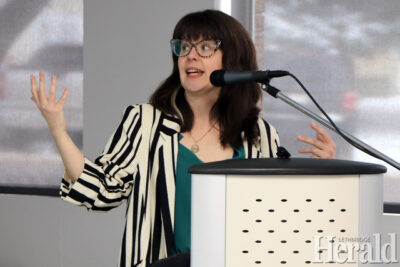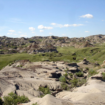SACPA presenter encourages critical thinking to counter misinformation
By Steffanie Costigan - Lethbridge Herald Local Journalism Initiative Reporter on February 9, 2024.
 Amanda Bigford, with the Canadian Association of Science Centres, speaks about the topic of misinformation on Thursday as part of the Southern Alberta Council On Public Affairs. Herald photo by Steffanie Costigan
Amanda Bigford, with the Canadian Association of Science Centres, speaks about the topic of misinformation on Thursday as part of the Southern Alberta Council On Public Affairs. Herald photo by Steffanie CostiganThe organization Science Up First spoke on the topic of misinformation in the digital age at the Southern Alberta Council on Public Affairs (SACPA) on Thursday.
The noon session was held in the dining room of the Lethbridge Senior Citizens Organization.
Science Up First is an initiative created from the Canadian Association of Science Centres to inform and clear up misinformation being spread throughout social media.
The presentation touched on group polarization, tactics used to misinform individuals on social media and how to find the tools to recognize misinformation from true information.
Guest speaker Amanda Bigford, English content creator at Canadian Association of Science Centres, shared how the initiative works.
“It starts off with misinformation being a concern. From there, the public or someone on our team might give these concerns to us. We will kind of collaborate with our group of experts, which is a bunch of experts from all across the country who specialize in different areas, we will write the articles,” said Bigford.
Bigford talked about disinformation and how it is used for bad intentions and how people can take bits of truth to create a believable narrative.
“Disinformation is false information that does have bad intentions behind it, and (using) information (with) truth to make false intentions. We call this cherry picking.”
An as an example, someone could take information out of an article and then create their own misinformation.
“You would cherry pick little pieces and put them into something else. This can be especially harmful because you are using parts of the truth. So people that do recognize parts of the narrative might be more inclined to believe,” she shared.
She said during the pandemic misinformation impacted people on social media and she talked about the confusion it led to.
“During the pandemic, there was a lot of misinformation, especially at the beginning when there was so much happening. Everything was changing constantly. That’s actually when we became Science Up First because someone had to do something about how much bad information was out there.”
Bigford said troll farms exist on social media and some people are paid to negatively comment or agree with false information being shared. She pointed out how misleading the comment sections can be sometimes.
“You might be wondering why it matters. Talking about not spreading misinformation, it can be deadly, to be fully honest, and that is no exaggeration. If you think about a topic like climate change, there is a lot of misinformation that goes along with it,” said Bigford.
Bigford encourages people to think critically, leaving emotions out and most importantly to research more about topics.
“There’s so much of it that it becomes overwhelming trying to pick out what the facts are. So some of the tactics to sort of protect yourself against this, if you see, like blatant misinformation on social media, report it.”
She said if information doesn’t sit right with a person to do research to see if claims actually do have any sort of backing to them.
18-17




